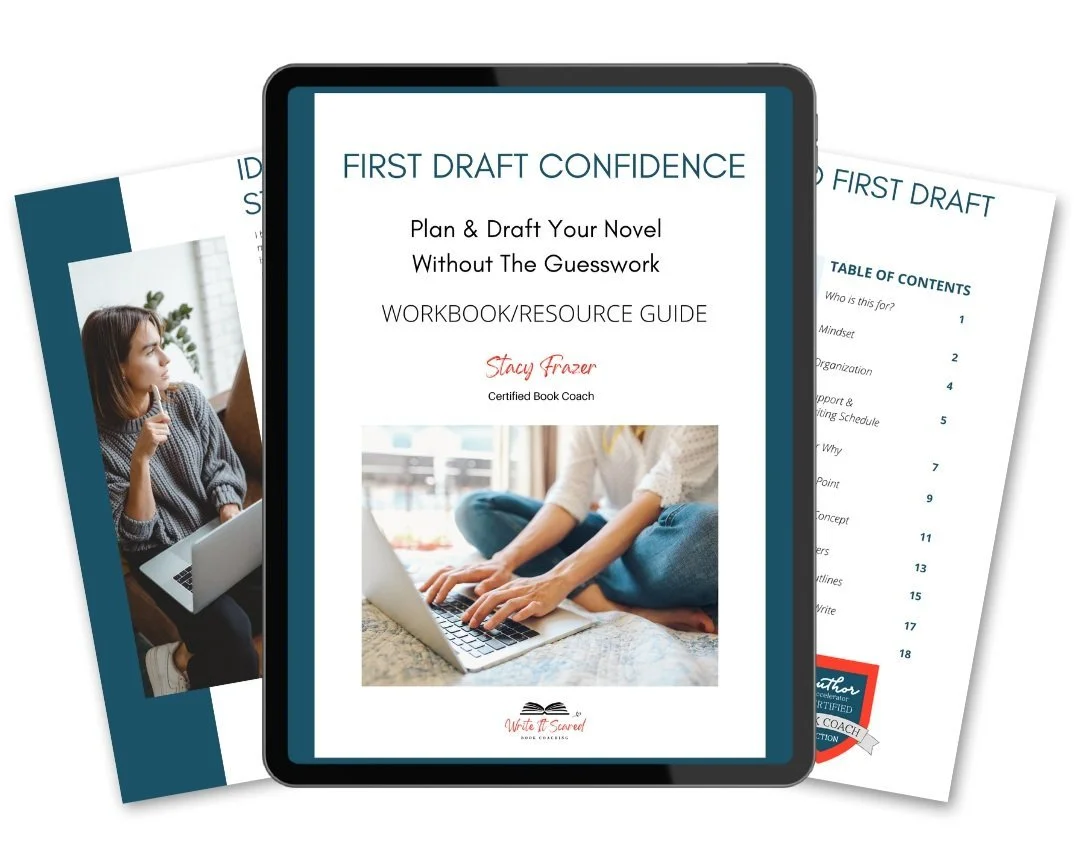How to Avoid the First Draft Rewriting Trap in Your Fiction Novel
Tell me if you can relate…
You sit down to write. Five minutes later, you’re still staring at the same sentence—rewriting, deleting, rewriting again.
You tell yourself you’re “just tweaking.” But deep down, you know what’s really happening: You’re stuck in perfection mode. It’s a trap. You know it, but can’t seem to stop.
Writing a book isn’t easy. We know this. We GET this. We’re intimately familiar with the word revision (or at least, we’ve heard of it. LOL).
And yet, even with that knowledge, so many writers—myself included—expect our first drafts to be good. Or at least… sorta good.
We forget (or we just haven’t discovered yet) that stories are built in layers, and the first draft is just layer one.
And having false expectations (believing the story should work or the writing should be good on the first try) causes real problems.
The Endless Rewrite Trap
Let’s call out a few of those problems:
Freezing: You stare at the cursor, type, delete, and retype the same five sentences.
Endless rewriting: You polish your opening chapters until they shine—while the rest of your story sits unwritten.
Second-guessing: You question every word, every comma, every sentence.
Procrastination: Suddenly, laundry or Netflix feels urgent.
Comparisonitis: You read a published book and immediately decide your first draft is garbage.
Sound familiar?
Yeah. For me too. And I know what a first draft should look like, yet still I get stuck. Why?
Because these problems are really just symptoms of something deeper: fear and self-judgment.
And we cannot successfully tackle fear by force. Not for very long, anyway.
Every time we try, the mountain gets harder to climb and our desire to climb it wanes.
Nope, unreasonable writing expectations (which are sometimes subconscious) need to be explored through the lens of self-compassion and empathy because you and me? We both want to be in this writing game for a long time.
What’s Really Going On Beneath Our First Draft Problems
Here’s the thing: of course you want your draft to be good. You care about your story. You’ve read stunning books and you want to write one, too. That desire is beautiful.
But it can also turn into pressure when we forget that good books are built, not born.
You can’t berate yourself into creativity. You can’t bully your brain into brilliance. (Have you ever told yourself “BAD WRITER!” and felt better or produced more afterward? Yeah, me neither.)
So let’s try something different. Let’s reframe how we think about that first draft.
Reframing the First Draft Fears
Start with two simple questions:
Why does the first draft need to be “good”?
Who’s judging it anyway?
When I get honest, my answers are:
It doesn’t. And only me.
Most of the time, my need to polish before moving on is masking my fear of failure, fear of rejection, of wasting my time.
But again… who’s judging that draft? Yep. Still just me.
And I can (mostly) control me. LOL.
The First Draft Mindset Shift
Let’s play with some “what ifs” to begin to shift our mindset to a more relaxed state around the first draft.
What if we assigned the first draft one job: to exist. In whatever messy, half-baked state it’s in.
What if we shifted the drafting experience from performing to creating? Drafting is private—it’s exploration—done with trusted folks, like a book coach or a writing buddy who acts like an alpha reader. Revision is performance—that’s where we shape it for other eyes. That’s where we need our internal editor and when critique becomes truly helpful.
What if we remember the other writers who have told us/showed us (like the ones that come on the Write It Scared Podcast) that their novel took umpteen different drafts and the first version is nothing like what is now available for purchase. Yet, the book on the shelf would not exist if they hadn’t written that “first draft.”
What if we reminded ourselves on the daily: we can’t expect a first draft to look like a finished novel.
What if we trusted the process?
What if we believed that no words are wasted?
What if when we fall into the first draft perfection trap we pull this list of what ifs out to remind ourselves that we can choose to act and think differently?
What then?
My hope is that we will afford ourselves a bit more grace and get back to the exploring part of writing—what first drafts are all about.
The Bottom Line
The first draft isn’t a test or a measure of your ability to write well. It's a beginning. It’s supposed to be messy, uncertain, and full of possibility.
So the next time you feel that itch to edit, freeze, procrastinate, or polish when you're drafting, please remind yourself: you’re not doing anything wrong. You’re not messing up. Check your expectations and then lower them. Right down into the dirt.
And don’t beat yourself up for having the expectation or feeling uncertain, just remind yourself that doubt and creativity go hand-in-hand. You don’t get to play with one without dancing with the other.
So take a deep breath, put your butt back in the chair, explore, and get some imperfect words on the page!

